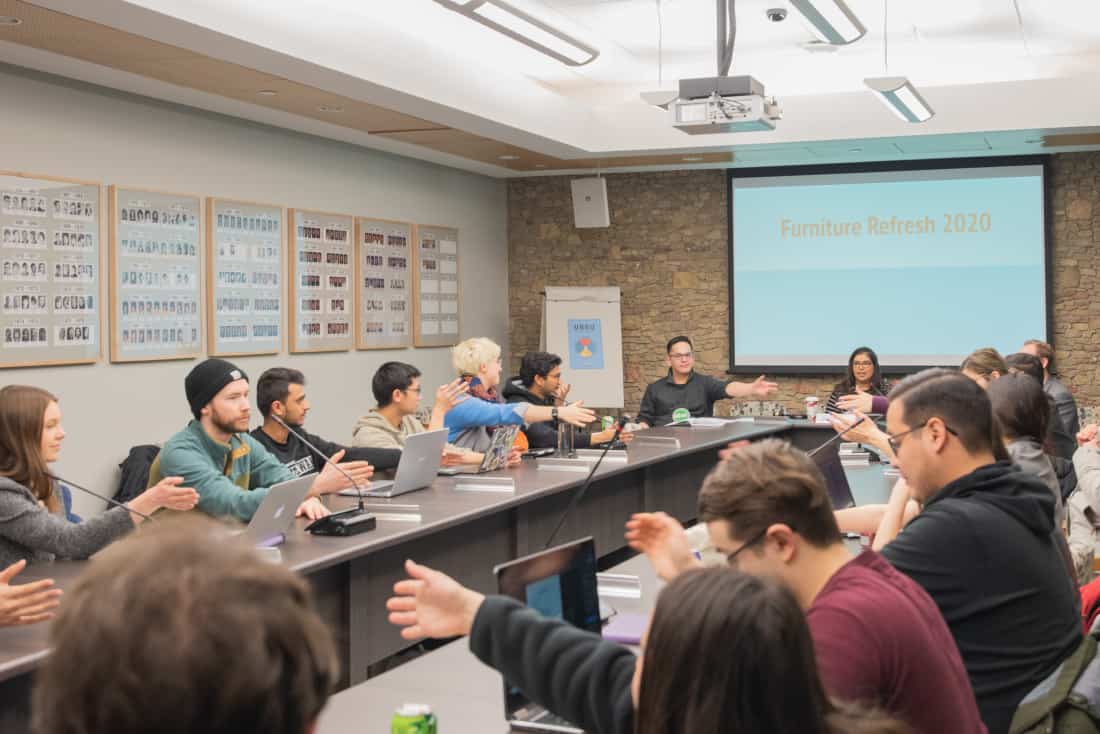
The last University Students’ Council meeting of 2019 had a last minute item added to its agenda: a discussion about the student union’s decision not to send a letter of support requested by Divest McGill on the topic of divestment.
The student-led group Divest McGill has been lobbying McGill University for seven years, asking for them to stop investing in the fossil fuel sector. The letters of support they requested from students’ unions across the world were meant to give them leverage ahead of a vote on divestment by their Board of Governors.
The discussion on Dec. 5 was proposed by council member Sarah Foley, an Arts and Science representative, and it was the first time the topic has come up at the council. The decision regarding the letter was made at an executive meeting back in October and included in the USC package mailed weekly to all councillors.
When the Sheaf reported on the topic in November, the University of Saskatchewan Students’ Union’s comment was that “at the moment, [they were] doing some more research on the topic and will discuss it once [they] receive more information.”
USSU president Regan Ratt-Misponas said the same thing in response to Foley’s questions.
“It’s something that we are still exploring,” Ratt-Misponas said. “We wanted to ensure that we weren’t being hypocritical, and we wanted to research where we are at in terms of sustainability as a campus before we move anywhere else and tell another campus what they can and cannot do in terms of their own sustainability.”
The executive’s approach to the situation remains to gather more information at the local level. USSU vice-president finance and operations Jamie Bell explained at the meeting that he has reached out to the university to meet and discuss their investment portfolio.
Bell adds that this discussion with the university should happen before “assuming that they have investments in fossil fuels.”
The Sheaf’s request for comment on the U of S investment portfolio as it relates to fossil fuels was answered by Greg Fowler, vice-president finance and resources. In it, he communicates that “given that the university is based in a highly resource dependent province … the university is “moving toward engagement rather than a divestment focus” and “focusing more on environmental, social and governance factors in our responsible investing strategies.”
Foley says that although further research on the university’s portfolio is necessary, it does not mean the executive’s decision was the right answer.
“I realize that it’s a very complex issue but I also do think that if we are asked for a letter of support for something that supports sustainability, whereas divestment might not be right for us, supporting a significant movement is important,” Foley said.
Another student councillor asked the executive to take decisions such as the letter of support to council instead of deciding on their own “because there are many different opinions that might be nice to hear.” Ratt-Misponas agreed to this request.
In an email to the Sheaf, Foley adds that although the decision was made by the executive, the information was available in the USC package for the councillors to bring up.
“The USC and the USSU have good communication practices — the decision was reported to Council in the Executive Committee minutes and reports,” Foley said. “There are opportunities in each meeting for councillors to make motions regarding the minutes and reports.”
Despite the talk of pursuing the topic further in the new year, the discussions about sending a letter of support after all came too late. On Dec. 5, the McGill Board of Governors voted against divesting from the fossil fuel sector. However, the conversation at the U of S continues as the USSU executive reports an interest in pursuing the topic further for future decisions.
“I ask that a member of our staff do a little more research into divestment and revisit it in the new semester,” Ratt-
Misponas said. “I agree with the spirit of a letter of support, but we want to make sure we are on the right path in terms of our own combat of climate change.”
—
Ana Cristina Camacho/ News Editor
Photo: Victoria Becker/ Photo Editor
Leave a Reply